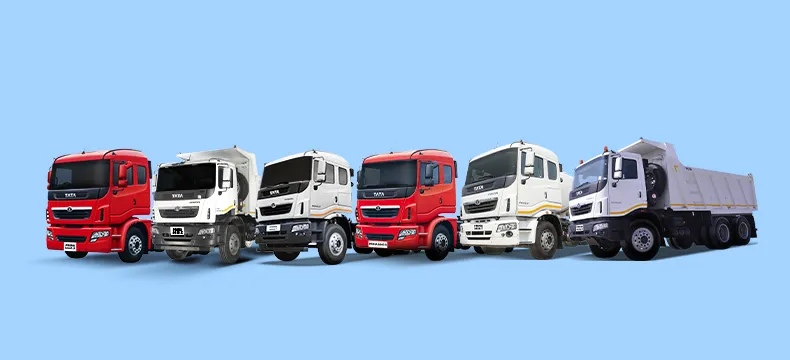12 Dec 2025

What You Need to Know About Truck Batteries?
- Tata Motors
- 3 Sep 2025
- COMMERCIAL VEHICLE
Introduction
When managing a fleet, choosing the right power source is more than just a tick-box decision. It directly affects performance, reliability and operational costs. Unlike personal cars, commercial vehicles require truck batteries that can withstand heavy-duty cycles, diverse routes, and multiple users.
The battery in a truck isn’t just for starting the engine. It also powers critical electrical systems and must operate seamlessly in intense driving conditions. This guide walks you through the essentials of truck batteries to help ensure dependable operations across your fleet.
Understanding Commercial Vehicle Batteries
Commercial vehicles demand more from a battery than a standard passenger car. They may cover vast distances, haul substantial loads or spend prolonged periods idle, all of which affect battery requirements. These distinct use cases require batteries engineered for durability and consistent power output.
Many types of truck batteries are designed with thicker lead plates and robust casings to meet higher energy demands and achieve longer lifespans. Trucks with sleeper cabs or additional electronics need batteries that can handle auxiliary power drains without fail. For instance, high-endurance batteries can support GPS systems, refrigeration units or tail-lift operations without compromising ignition.
The construction of truck batteries often includes vibration-resistant housing and corrosion-resistant materials. These are important factors to consider when driving over uneven terrain or in extreme weather conditions. Most commercial units last around 3 to 5 years, though truck battery lifespan varies depending on operating conditions.
Prioritise Battery Maintenance
Well-planned truck battery maintenance is crucial to preventing breakdowns and extending the service life of your vehicle. Batteries degrade over time, but proper care can help prolong their lifespan. Here are a few must-follow practices:
- Clean terminals regularly, as built-up dirt reduces charging efficiency.
- Ensure the battery is safely mounted to avoid damage from vibrations.
- Use the correct charging adaptors for all stud posts.
- Test batteries annually, especially before peak operating seasons.
Symptoms of potential battery failure include difficulty starting the engine, flickering lights or corroded connectors. Weather conditions, particularly in the Middle East, can also play a big role. Hot climates accelerate fluid evaporation, while cooler desert nights can slow chemical reactions inside the battery. Hence, regular inspections are non-negotiable.
Types of Truck Batteries
There are several types of truck batteries, each designed to cater to different commercial applications.
-
Lead-Acid Batteries (Flooded):
They are cost-effective, widely available and require regular maintenance. They’re ideal for fleets that can accommodate scheduled servicing.
-
AGM (Absorbent Glass Mat) Batteries:
They are sealed and maintenance-free. They offer better vibration resistance and faster charging. Suitable for vehicles equipped with stop-start technology or those with intensive accessory use.
-
Gel Batteries:
They are known for deep-cycle performance and low self-discharge rates. Hence, they are often used in extreme weather or for long-haul trucks.
Choosing between these types of truck batteries depends on your fleet’s specific needs, usage pattern and maintenance capabilities.
What to Look for in the Best Truck Battery?
The best truck battery isn’t simply the one with the longest warranty or the highest price tag. Instead, focus on function and fitness for purpose.
-
Cold Cranking Amps (CCA):
This is especially crucial when operating in colder climates or at high altitudes.
-
Reserve Capacity (RC):
It determines how long the battery can run the truck’s systems if the alternator fails. It is valuable for logistics vehicles in remote areas.
-
Casing Quality:
Look for durable, high-grade enclosures that resist heat and vibration.
-
Maintenance Needs:
A low-maintenance option helps reduce service intervals and operational downtime.
When investing in the best truck battery, it pays to choose a reputable manufacturer known for supporting fleet operations in hot, rugged environments like the Middle East.
Conclusion
Commercial truck batteries are essential to maintaining fleet performance and minimising costly downtime. From understanding types of truck batteries to actively managing truck battery maintenance, every decision impacts your vehicle’s reliability and overall operational costs.
By investing in the best truck battery suited for your needs and ensuring regular checks, you not only extend the truck battery's lifespan but also keep your business running smoothly, even in the region’s most demanding environments.
Looking for durable, high-performance commercial vehicle batteries? Explore Tata Motors trusted aftersales network and parts support to find the right solution for your fleet.
FAQs
How can you know if your truck battery needs replacing?
Common signs comprise a slow engine crank, dim lights, frequent jump-starts or warning lights on the dashboard. If your battery is over three years old, it’s wise to have it tested.
Can you use a regular car battery in your truck?
Car batteries aren’t built to handle the power demands of heavy-duty trucks. Hence, always opt for commercial-grade truck batteries suited to your vehicle type.
Does hot weather in the Middle East affect battery performance?
Extreme heat can cause fluid evaporation and internal damage, which shortens the battery’s lifespan. Regular inspections and heat-resistant battery designs help eliminate this problem.
What’s the difference between AGM and lead-acid truck batteries?
AGM batteries are sealed, maintenance-free and offer better resistance to deep cycling. Traditional flooded lead-acid batteries require periodic maintenance but are more budget-friendly.
- Tags





















